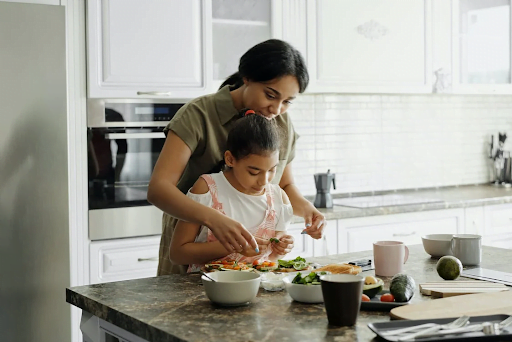Healthy Food Is More Expensive Than Unhealthy Food - Is It a Myth?
Some people believe adopting a healthy diet would cost more, but is that true? You’ll hear students say they would love to eat healthier but cannot afford to. Many of them believe cooking their food would cost a fortune, so they opt for fast food, including unhealthy items. When you can find takeaway meals from as low as $1.5, it looks enticing to prioritize fast food compared to cooking healthy options at home.
Table of Contents
TogglePeople found the ability to get more money by request, and have learned more about healthy diets. But there have been many stories about the cost of healthy eating.
In addition to online interactions, studies have helped compare the price of foods, and often, the findings show less healthy foods are cheaper. This only reinforced the belief that healthy food is more expensive.
Going with the price-per-calorie formula, healthy food with fewer calories appears more expensive to buy. However, healthy options are cheaper if you compare foods from the same group. Many people look at the quantity of the food they buy instead of the calories they get, which has helped reinforce that healthy food is an expensive myth.
How Healthy Food Leads to Healthy Life
While thinking about the cost of your diet, you should consider how healthy food affects the body. When we eat healthy food, it helps prevent long-term diseases such as diabetes, stroke, and heart disease. It also lowers your risk of developing some cancers. Most importantly, you can maintain a healthy weight, which prevents many of the conditions mentioned. So, considering the benefits you draw from a healthy diet, it’s fair to say healthy food is cheap as you will not need to worry about medical expenses arising from poor eating habits.
The body needs the energy to function normally and help you stay alive. You can get this energy from the food you consume, mostly proteins, fats, and carbohydrates. Vitamins and minerals form a key part of your diet if you want to stay healthy. A balanced diet highlights foods from all groups, including fruits and vegetables, proteins, and fats. Note that you should avoid overconsumption of sugar as this could trigger a series of health problems.
Besides these options, you need a good amount of fiber and water. All these foods you can find affordably if you commit to healthy eating and avoid eating out. Once you understand why healthy food is good for you, you will find it easy to manage your budget.
How Healthy Food Affects Your Mood
There’s also a connection between healthy food and mental health. Besides affecting your physical health, what you eat also affects how you feel. A healthy diet will help improve your mood and give you more energy. Consuming proteins from foods like tofu, turkey, fish, beans, and eggs is linked with higher levels of norepinephrine and dopamine, chemicals that influence your mood, concentration, and motivation. Blood sugar fluctuations and nutritional imbalances could trigger mood swings. Without a steady source of healthy foods, your brain and body will not function properly.
But, what does the gut have to do with your mood? When you consider the connection between your gut and brain, it’s important to know 90% of serotonin receptors are in the gut. The gut-brain axis brings a greater understanding of the relationship between diet and disease, including anxiety and depression. Fixing your gut or the kind of diet you consume could be the solution to improving your mental health, but you need to work with a medical professional to know which healthy food to eat and what to avoid.
How to Change Habits Early
Finding healthy food to make is the beginning of your journey to good health. However, if you want to maintain good health in the long term, it’s important to start the habit early. Expanding waistlines is a concern as the obesity rate has tripled since 1975. More than 1.9 billion adults are overweight, which is a big problem that starts with the food we consume. This is why healthy food should be cheaper to help more people embrace a diet that improves their well-being.
The younger generation is especially at risk of consuming high-calorie, low-nutrient foods. Fat, high levels of sugar, and salt place children at a bigger risk of developing heart disease and type 2 diabetes. More worryingly, the habits kids form in childhood stick for many years.
People are conditioned to believe that healthy food is expensive because the price of dairy, meat, and fish is higher, and it costs more to produce organic foods. Yet producing nutritious foods did not cost the earth. Consuming chia seed smoothies will cost more and could be a luxury, but lentils, carrots, and potatoes are way cheap.
Sometimes, healthy food is expensive because you don’t buy it from the right places. Healthy means don’t have to cost you a lot. All you need is to make smart choices when shopping for food. By dropping some items from your diet, you could not only save money but also help your family have improved health. Healthy food can make you feel better, so the key is focusing on whole foods and fewer processed options.
Money-Rich, Time-Poor
Is healthy food expensive for everyone? Not necessarily, as some of the people who have the worst health record have enough disposable income to afford a healthy diet consistently. Having less money is a challenge when it comes to maintaining good nutrition as it drives food choices, but this doesn’t mean it’s not possible to find healthy food items. Often, people who maintain a poor diet prefer takeaway meals as this helps them avoid getting in the kitchen.
Those on low incomes are likely to consider calorie-dense foods compared to vegetables or fruits because these foods are more fulfilling. While a cheeseburger will fill you up better than an apple, it’s not good for your health.
Another question is, can healthy food taste good? It’s possible to prepare a fulfilling, healthy meal with little time. A simple recipe like cheese gratin, tomato, and courgette will cost only some cents and take about eight minutes to cook. This is a healthy and cheaper option than a takeaway.
Promoting healthy eating in cash or in a time-poor society sounds challenging. In some situations, such campaigns on low-income societies have alienated the intended audience by stigmatizing those living at the end of austerity. What people eat is central to their identities, so it’s important to recognize this while addressing questions about improving their diet.
Tips for Eating Better on a Budget
You can counter the common misconception that healthy food is expensive by knowing how to find healthy foods on a budget. You could embrace many options that will elevate your health and allow you to keep the same budget. More expensive does not equal health. Do your research and avoid being seduced by organic labels and marketing gimmicks when shopping. Here are tips you could consider for healthy eating on a budget.
- Frozen and Canned Fruit and Vegetables
For many people looking for where to buy healthy food, canned and frozen food doesn’t appear a good option, but this is not necessarily true. Frozen and canned food can be nutritious if the food was packed when just ripe, which helps lock in nutrients. Often, frozen and canned foods are cheaper compared to fresh ones. In addition, the foods can last for ages if you store them in your pantry or freezer, which makes them an option if you’re short on time or don’t shop regularly.
While shopping for canned food, remember to check the salt content in the food or any added sugar in the frozen veggies and fruits. Consider frozen foods without added sugar. For vegetables, consider those with no added salt.
Extend a recipe as much as possible. Making foods that freeze well will help you extend meals. Look online for scrumptious, healthful recipes for casseroles and soups that are inexpensive and simple to stretch.
Make something you can freeze and keep the leftovers to enjoy later in the week. Additionally, you’ll use up less kitchen time than if you prepare a different dish every night.
- Plan Your Meatless Meals Each Week
There are many sources of protein you could consider for your meals. Meat and fish are some of the most expensive options on a shopping list, so you might want to get fewer of these and focus on plant-based alternatives. Foods like pulses (peas, lentils, and beans) are nutritious, work perfectly in place of meat, and they’re cheap. Also, if you have a busy week, you can prepare meals on the weekend to reduce the time you need to prepare meals when you get back home.
- Grab Special Deals
One way to save is to find special deals. Before shopping, go online and compare the prices of items at different stores to know if you can find discounts and better prices. Also, consider signing up for rewards programs that award you discounts. You will be surprised by how much you can save by hunting for discounts and other offers from supermarkets.
- Shop Seasonally
Some foods are seasonal, so you expect different prices depending on whether you’re buying in or out of season. Shopping seasonally saves you money and is also a good way to add variety to your diet.
If you’re not focused on the items that are in the season, you can choose frozen veg and fruit. Another idea is finding affordable goods in the local farmers’ market. Here you can buy fresh food that you can prepare and store for prolonged use.
- Include Legumes
Legumes are a good choice for your meals as they’re easy to store for many days. You can spread them out in your diet for several weeks, which is ideal if you have a busy schedule and cannot shop more often. You can add lentils to stir-fries, salads, and curries.
Besides, legumes are considered vegetables and work as a protein alternative, which makes them a superfood. Per serving, protein is one of the most expensive foods. You don’t have to always use red meat or fish as legumes can partly substitute well if you want a cheaper protein for your healthy diet.
- Plan Before You Shop
It’s common to go out shopping with some items in mind only to go home with things you didn’t have on your list. To ensure you don’t spend your budget on unwanted items, it’s always advisable to plan.
This also prepares you as you know which items in your pantry need replenishing. Check how much you need in vegetables and fruits. Also, decide which types of protein you prefer depending on your budget. Check online for deals, then make your final list and stick to it.
- Shop Effectively
You have many ways you can shop for healthy food effectively. Some of the ideas you can consider include:
- Have a shopping list and respect it
- Don’t shop when you’re hungry
- Check for prices per unit instead of the overall price
- Switch brand names for generic
- Supermarkets often promote what they want you to buy at eye level, so explore the shelves below to find cheaper alternatives
- Shop once a week or fortnightly instead of several times per week
- If things are cheaper, buy in bulk
Conclusion
You can eat healthily and affordably if you stick to a plan and find the right food options. You don’t need to consume expensive protein as you can use plant-based alternatives. Check for discount deals to save on your shopping, and always stick to your shopping list. Eating healthy is not expensive if you are disciplined.
How do you maintain a healthy diet on a budget? Leave a comment below.

